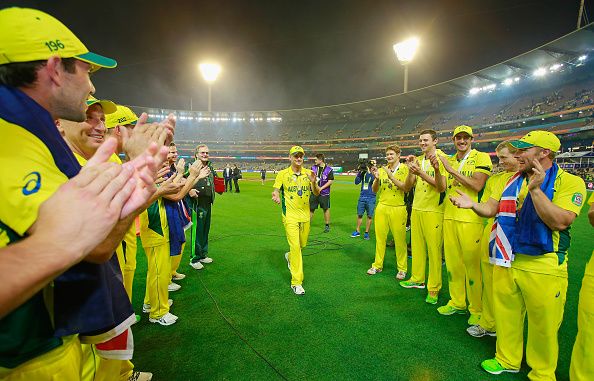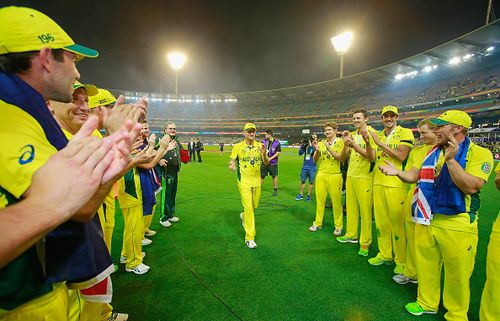
Michael Clarke bows out of ODIs with a legacy

Melbourne, March 29: A responsible match-winning knock of 74 runs off 72 balls in the World Cup final on Sunday, guiding his team to a record-stretching fifth title triumph in cricket's showpiece event, marked Australian skipper Michael Clarke's farewell from One-Day Internationals (ODIs).
Clarke on Saturday announced that his decision to bow out of ODIs after Sunday's final at the Melbourne Cricket Ground (MCG), which was his 245th 50-over match.
Earning spotlight in 2004 India series
He came into the spotlight after becoming the 12th Australian to score a century in his Test debut against India in 2004, bursting onto the international scene as a 23-year-old, having already made his ODI debut a year earlier.
He played a vital hand in Australia winning their first Test series in India after 35 years.
Clarke, lovingly known as "Pup", has been Australian cricket's pin-up boy for over a decade, becoming a celebrity thanks to his genuine personality, large endorsements and a high-profile relationships.
But to his credit, he never let the off-field spotlight affect his on-field game and over the years matured into the team's most reliable batsman.
After impressing in India, he marked his return to his country with a century in his debut Test at home against New Zealand, becoming one of the few cricketers to achieve the feat.
Battling through crises
However, sunny days soon turned gloomy and a slump in form during the 2005 Ashes led to him being dropped. But he bounced back quickly to be recalled to the team during the the return leg of the series in Australia in 2006-07.
He helped the team win their third consecutive World Cup in 2007. But his stock rose more in Tests, averaging over 50 in each calendar year between 2006 and 2009.
Personal problems with his model girlfriend Lara Bingle threatened to derail his career in 2010 when he was forced to leave the touring team to New Zealand midway.
Despite the public scrutiny and a bitter break-up with his attention-seeking girlfriend, his stature continued to rise in his country's cricketing circle.
Identifying his lack of power-hitting abilities in Twenty20s, he retired from the shortest version of the game in 2011.
His astute judgement of his game bore fruit as his batting improved significantly after the decision.
Captaincy and best period of batting
Identified as the man to replace Ricky Ponting as the skipper, he grabbed the opportunity like a fish to water after being appointed the team's skipper in both Tests and ODIs, despite not being a unanimously accepted appointment.
The added duty enhanced his considerable batting skills as he went through one of the most prolific run-scoring streaks in Test history.
He scored eight Test centuries, including three double-hundreds and a triple-hundred, and two "Allan Border" medals, the most prestigious individual prize in Australian cricket.
In total he was awarded the medal (2005, 2009, 2012 and 2013) and the "Australian Test Player of the Year" (2009, 2012, 2013, 2014) four times each.
His stupendous batting form coincided with Australia's rise in Tests and the summer of 2013-14 saw him lead his side back to the summit of Test rankings.
Persistent injuries
But since reaching the lofty heights as a batsman and skipper, he endured a torrid time with injuries in 2014, with persistent hamstring and back problems.
He was forced to leave the Zimbabwe Tri-series midway in August last year. Playing the home ODI series against South Africa, Clarke re-injured his hamstring and returned to the field against India at the Adelaide Oval on December 9.
But his willingness to play was betrayed by a dodgy back and a hurting hamstring that brought serious doubts on his World Cup participation at home.
The Sydney-born batsman showed good progress in his recovery to force the selectors to retain him as captain for the tournament. The 33-year-old repaid the faith with interest on Sunday and he can now retire a content man after leading his team to yet another World Cup glory.
Clarke became the second captain -- after Pakistani Imran Khan in 1992 -- to bid goodbye to the 50-over format after pocketing the biggest prize in cricket, that too at home.
Michael Clarke - in numbers (In order of matches, runs, highest score, average)
Tests - 108, 8432, 329 not out, 50.79.
ODIs - 244, 7907, 130, 44.42.
T20Is - 34, 488, 67, 21.21.